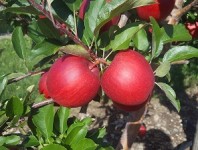Event Details
Date
December 22, 2018
Time
5:00PM-8:00PM
Location
Hudson Valley Research Lab
3357 Rt. 9W
Highland, NY 12528
Host
Hudson Valley Research Lab
Erica Kane
845-691-7151
email Erica Kane
HVRL Farm
The Heirloom Orchard: A Three-Day Series on Estate Orchard Management
December 22, 2018
Join Peter Jentsch & Dr. Srdan Acimovic, homeowners and management professionals for a three-week series, each evening discussion and workshop focusing on 3 hours devoted to establishing
and maintaining new or existing estate orchards using 3 with apple and cider tastings, hands-on experience in our research orchards. Dec 8th, 15th, 22nd.
Topics will cover:
New Orchard Establishment and Management Options:
Day 2 (Dec 15): Tree revival: Pruning, training, crop load and pest management in organic production systems
Day 3 (Dec 22): New Orchard Plantings: design considerations & pest management using IPM production
Free for current HVRL, Inc. members; non-members $100.00
Call Erica at 845-691-7151 to register
Peter Jentsch & Dr. Srdan Acimovic, are Extension Associates, Department of Entomology and Integrated
Plant Science (Plant Pathology & Plant Microme Biology) respectively with the College of Ag. Science at
Cornell University stationed at the Hudson Valley Research Laboratory (HVRL) in Highland, NY.
full series
Heirloom Orchard Mgmt Invite (PDF; 1645KB)



































